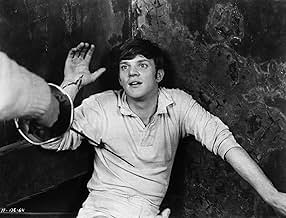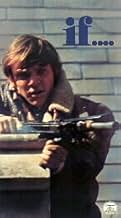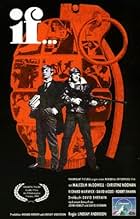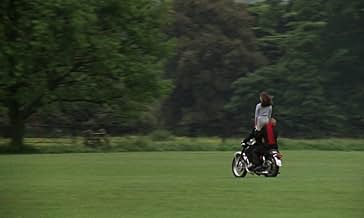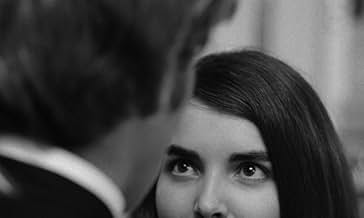NOTE IMDb
7,4/10
26 k
MA NOTE
Cette histoire allégorique narre la rébellion menée par l'élève Mick Travis dans une très ancienne école privée en Angleterre.Cette histoire allégorique narre la rébellion menée par l'élève Mick Travis dans une très ancienne école privée en Angleterre.Cette histoire allégorique narre la rébellion menée par l'élève Mick Travis dans une très ancienne école privée en Angleterre.
- Réalisation
- Scénario
- Casting principal
- Nomination aux 2 BAFTA Awards
- 2 victoires et 4 nominations au total
Mary MacLeod
- Mrs. Kemp - Staff
- (as Mary Macleod)
Avis à la une
The best film ever made about school life; the rituals, the drudgery, the humiliation and ultimately the excitement. Anderson's masterpiece works on a number of levels, not least as one of the cinema's great pieces of surrealism. It's a state of the nation movie, a fantasy, an account of public school life told with an almost documentary-like precision and it's as fresh today as it was when it first appeared, (hard to believe that was almost 40 years ago or that Malcom McDowell was ever this young).
Using Jean Vigo's "Zero De Conduite" as a template, (it's not a remake), Anderson's movie is quintessentially youthful and so accurately does it depict its milieu as to appear almost arrogant. He handles revolution with a grandstanding authority and homosexual, (and heterosexual), schoolboy yearning more romantically than any other film I can think of, (Wallace's display in the gymnasium as blonde, beautiful, tousle-haired Bobby Phillips looks on is blissfully homo-erotic), and he does this with a masterly control of the medium. (His comments about financial restraints dictating the fluctuations between black-and-white and colour photography may well be true but the choices seem inspired, nevertheless and the great Miroslav Ondricek's camera-work is superb).
He was also a great actor's director, often working with many of the same actors both in theatre and in cinema and he extracts marvellous performances from the likes of Arthur Lowe, Peter Jeffrey, Mona Washborne and Geoffrey Chater representing the Establishment as well as pitch-perfect performances from David Wood, Richard Warwick, Rupert Webster, Robert Swann and Hugh Thomas, all new to cinema, as the students.
The film made Malcom McDowell a star and for a few short years, (here, in "O Lucky Man", as Alex in "A Clockwork Orange"), that star burned brightly before he sold out to Hollywood and his career began to flounder in a series of mediocre American movies, reaching a nadir with "Caligula". But his performance as Mick Travis is a marvel and both it and the film that first encapsulated it remain among the finest achievements in British cinema.
Using Jean Vigo's "Zero De Conduite" as a template, (it's not a remake), Anderson's movie is quintessentially youthful and so accurately does it depict its milieu as to appear almost arrogant. He handles revolution with a grandstanding authority and homosexual, (and heterosexual), schoolboy yearning more romantically than any other film I can think of, (Wallace's display in the gymnasium as blonde, beautiful, tousle-haired Bobby Phillips looks on is blissfully homo-erotic), and he does this with a masterly control of the medium. (His comments about financial restraints dictating the fluctuations between black-and-white and colour photography may well be true but the choices seem inspired, nevertheless and the great Miroslav Ondricek's camera-work is superb).
He was also a great actor's director, often working with many of the same actors both in theatre and in cinema and he extracts marvellous performances from the likes of Arthur Lowe, Peter Jeffrey, Mona Washborne and Geoffrey Chater representing the Establishment as well as pitch-perfect performances from David Wood, Richard Warwick, Rupert Webster, Robert Swann and Hugh Thomas, all new to cinema, as the students.
The film made Malcom McDowell a star and for a few short years, (here, in "O Lucky Man", as Alex in "A Clockwork Orange"), that star burned brightly before he sold out to Hollywood and his career began to flounder in a series of mediocre American movies, reaching a nadir with "Caligula". But his performance as Mick Travis is a marvel and both it and the film that first encapsulated it remain among the finest achievements in British cinema.
I was in a sort of daze for hours after seeing If...for the first time in 2017. A work of art? Certainly but also a poetic historical document. After all the film dates back to 1968. 1968! when things were really changing and youth was taking a step forward, reminding the older generation that we'll be suffering the consequences of your thoughtlessness. So move over or else. I remember my father despising this film, he call it, propaganda. Propaganda?Maybe that's why I never saw it, until now. I was really moved by the film. Malcolm McDowell is the perfect man to incarnate the revolution that was about to come. It also made me look for all of Lindsay Anderson films - Just half a dozen feature films but my God! What an extraordinary director.
More so than with any other film I've watched in recent memory, I rather don't entirely know what to say after watching this. There's a stark, jolting precision and brutality to much of the movie, even well preceding the abject violence, yet also a weirdly poetic beauty at many points. This is as true for Lindsay Anderson's direction as it is for David Sherwin's screenplay, in all ways, but also for the acting. Performances are exact and practiced, but also fluid and natural. Whether presented in pure black and white, or in color under drab skies or sunny blue, the very image before us and cinematography is rich and lush. For viewers such as myself whose perspective on schooling in the United Kingdom is informed wholly by cinematic exhibition and not personal experience, the strict regimentation and forced social arrangements are both fascinating and uninviting - to say nothing of what embellishments the movie makes in imparting its tale. When all is said and done, the result is that for any similarities one could find to this, that, or the other thing in more than 50 years since, 'If....' still feels quite unlike anything else.
For all the pomp and circumstance and plays for power and social position, and the inherent fictional nature of the feature, there's an earnestness to every aspect - characters, dialogue, scene writing, narrative, direction, performances - that comes off as very real, organic and relatable. It's an enticing balance maintained at all times between various moods and tones, with the interactions between characters taking foremost precedence as a focal point and anchor, whether trending toward antagonism or camaraderie. And with that said, not to belabor the point, but the contributions of the actors seems particularly essential in 'If....' to cementing the picture. As I've suggested, I think everyone on hand does a fine job of helping to bring the story to life with portrayals of nuance, poise, and personality, yet this goes above all for those whose characters are ultimately dubbed the "crusaders." While credited alongside those more prominent, Rupert Webster and Christine Noonan have little more than bit parts as Philips and "the girl"; we know so little about their characters, and one wishes they could have been fleshed out more at least to solidify motivations. Still, Webster and Noonan make strong impressions despite their limited time on screen. David Wood and Richard Warwick are decidedly more visible as Knightly and Wallace, and both actors do well in embodying the sneering disregard of the boys. But of course it's unmistakable Malcolm McDowell, starring as protagonist Mick Travis, who stands out most of all. There are subtleties in McDowell's distinct vocal timbre, and in his expressions and body language, that communicate definite confidence, defiance, and attitude, and just as it's hard to imagine anyone else as Alex DeLarge in 'A clockwork orange,' he is a perfect fit to depict the boiling malcontent of young Travis.
I don't feel that it's perfect. As well made as it is, and as enjoyable as the viewing experience is, there's a part of me that think maybe my perception of shortcomings is actually just an inability to glean the artistic choice behind certain inclusions. Again speaking to the characters of Philips and the girl - we're given minimal information of them generally, and little or nothing that would meaningfully serve to explain their participation in the finale. Jute is given a fair amount of screen time early on, then wordlessly fades from the narrative. One could infer to a reasonable certainty the significance of a specific scene featuring Mrs. Kemp, but in the end it just seems superfluous to the whole. Broadly speaking, it just seems like the writing could have stood to be a little tighter and more concrete; by no means does this completely dampen the value, but it's a notable aspect of the production.
Subjective faults notwithstanding, however - by and large, 'If....' is pretty fantastic. I'm not sure that it totally met my expectations based on what little I had read of it, but for the most part, I'm glad to have been surprised. It's a wonderfully subversive story of individuality and discontent set against the rigidity and corruption of the establishment, and it's presented with a refined touch behind almost every element. Even if something about the feature feels a little off, and not fully copacetic, that sense is minor in comparison to the engrossing drama to play out. Minding content warnings for violence and nudity, this isn't going to be for everyone, but I think it's solid enough that I'd have no qualms about recommending it to just about anyone. Though perhaps not altogether essential, 'If....' is an excellent, satisfying picture that's worth checking out if one has the opportunity.
For all the pomp and circumstance and plays for power and social position, and the inherent fictional nature of the feature, there's an earnestness to every aspect - characters, dialogue, scene writing, narrative, direction, performances - that comes off as very real, organic and relatable. It's an enticing balance maintained at all times between various moods and tones, with the interactions between characters taking foremost precedence as a focal point and anchor, whether trending toward antagonism or camaraderie. And with that said, not to belabor the point, but the contributions of the actors seems particularly essential in 'If....' to cementing the picture. As I've suggested, I think everyone on hand does a fine job of helping to bring the story to life with portrayals of nuance, poise, and personality, yet this goes above all for those whose characters are ultimately dubbed the "crusaders." While credited alongside those more prominent, Rupert Webster and Christine Noonan have little more than bit parts as Philips and "the girl"; we know so little about their characters, and one wishes they could have been fleshed out more at least to solidify motivations. Still, Webster and Noonan make strong impressions despite their limited time on screen. David Wood and Richard Warwick are decidedly more visible as Knightly and Wallace, and both actors do well in embodying the sneering disregard of the boys. But of course it's unmistakable Malcolm McDowell, starring as protagonist Mick Travis, who stands out most of all. There are subtleties in McDowell's distinct vocal timbre, and in his expressions and body language, that communicate definite confidence, defiance, and attitude, and just as it's hard to imagine anyone else as Alex DeLarge in 'A clockwork orange,' he is a perfect fit to depict the boiling malcontent of young Travis.
I don't feel that it's perfect. As well made as it is, and as enjoyable as the viewing experience is, there's a part of me that think maybe my perception of shortcomings is actually just an inability to glean the artistic choice behind certain inclusions. Again speaking to the characters of Philips and the girl - we're given minimal information of them generally, and little or nothing that would meaningfully serve to explain their participation in the finale. Jute is given a fair amount of screen time early on, then wordlessly fades from the narrative. One could infer to a reasonable certainty the significance of a specific scene featuring Mrs. Kemp, but in the end it just seems superfluous to the whole. Broadly speaking, it just seems like the writing could have stood to be a little tighter and more concrete; by no means does this completely dampen the value, but it's a notable aspect of the production.
Subjective faults notwithstanding, however - by and large, 'If....' is pretty fantastic. I'm not sure that it totally met my expectations based on what little I had read of it, but for the most part, I'm glad to have been surprised. It's a wonderfully subversive story of individuality and discontent set against the rigidity and corruption of the establishment, and it's presented with a refined touch behind almost every element. Even if something about the feature feels a little off, and not fully copacetic, that sense is minor in comparison to the engrossing drama to play out. Minding content warnings for violence and nudity, this isn't going to be for everyone, but I think it's solid enough that I'd have no qualms about recommending it to just about anyone. Though perhaps not altogether essential, 'If....' is an excellent, satisfying picture that's worth checking out if one has the opportunity.
Made in 1968, this film still made me shiver even though I started at public school in 1977. Things had changed somewhat by then, but not beyond recognition, and for sure I felt powerful echoes in this movie. By the time I left, the country was steeped in Thatcherism, and the style of self advancement that came with it was replacing the old guard watchers of 'If....' would recognise. The housemaster and headboy were 2 characters I can especially recall, but there are flashes of others in many of the characters.
When you see this film, see it as a historical satire, with first the historical atmosphere of a public school being accurately recreated, then second the satire taking form just in time to administer the purgative judgement of the surreal denouement.
There. Spoken like a public schoolboy.
When you see this film, see it as a historical satire, with first the historical atmosphere of a public school being accurately recreated, then second the satire taking form just in time to administer the purgative judgement of the surreal denouement.
There. Spoken like a public schoolboy.
This glorious 1968 film is a document not just of its times but of the eternal and mysterious communion between two enormous artists. Lindsay Anderson, the director, the mentor, the older man and Malcolm McDowell his young, brilliant, loving disciple. The trust between this two men is overwhelming and the results are in every frame in every nuance. For me, to see this film after many years was a remarkable emotional experience. Daring, visionary with a Malcolm McDowell that broke new ground with the fearlessness of an explorer venturing into totally virgin territory. Brilliant, beautiful, unique. Lead by the magical hand of Anderson and McDowell we confront the anger of the artists with their love for each other. Wow!
Le saviez-vous
- AnecdotesA British ambassador called the film "an insult to the nation". The then Lord John Brabourne read an early draft and called it "the most evil and perverted script I've ever read. It must never see the light of day".
- GaffesWhen Mick is standing in front of the Trueform shoe store, the camera and crew members are seen reflected in the windows of a passing bus.
- Citations
Mick Travis: One man can change the world with a bullet in the right place.
- Crédits fousThe film's opening prologue states: Wisdom is the principal thing; therefore get wisdom: and with all thy getting get understanding PROVERBS IV:7
- Versions alternativesIn the USA, the film was originally released uncut, with an X rating. However, a more commercial rating was preferred and the film was reissued with an R rating after scenes of male frontal nudity were removed from the shower scenes.
- ConnexionsFeatured in Horizont (1971)
- Bandes originalesSanctus
from the "Missa Luba" (Philips Recording)
Sung by Les Troubadours du Roi Baudouin (uncredited)
Conducted by Fr. Guido Haazen O.F.M (uncredited)
Meilleurs choix
Connectez-vous pour évaluer et suivre la liste de favoris afin de recevoir des recommandations personnalisées
- How long is If....?Alimenté par Alexa
Détails
- Durée1 heure 51 minutes
- Couleur
- Mixage
- Rapport de forme
- 1.66 : 1
Contribuer à cette page
Suggérer une modification ou ajouter du contenu manquant



